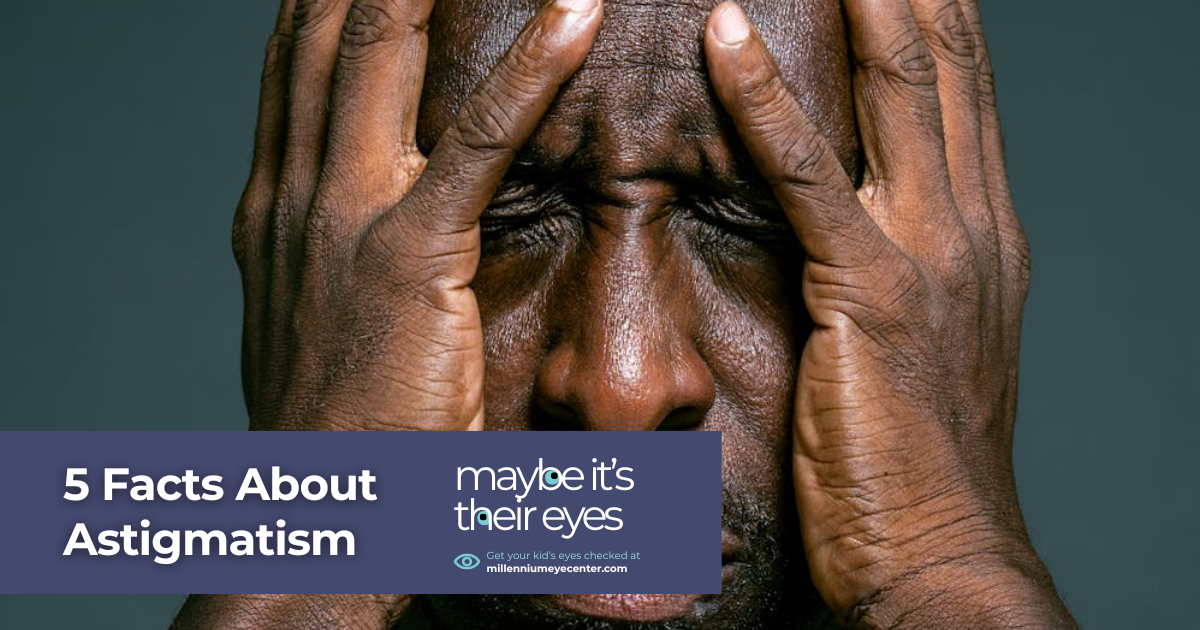Astigmatism is a common eye condition that can be easily managed with the right care. Don’t let it hold you back from enjoying clear vision. Regular eye exams and personalized treatment options by your Orlando Eye Doctor can help you live a comfortable life. – Dr. Lauretta Justin, Millennium Eye Center
Astigmatism is one of the most common vision conditions, yet it can often be misunderstood. If you or someone you know has been diagnosed with astigmatism, there’s no need to worry—it’s highly manageable with the right care from your eye doctor.
Here are five essential things to know about astigmatism:
-
What is Astigmatism?
Astigmatism is a common refractive error that occurs when the cornea (the clear front surface of the eye) or the lens inside the eye has an irregular shape. Instead of being perfectly round like a basketball, the cornea of someone with astigmatism may be shaped more like a football. This causes light entering the eye to focus unevenly on the retina, leading to blurry or distorted vision at all distances.
-
Symptoms of Astigmatism
The symptoms of astigmatism can vary from person to person, but the most common signs include:
- Blurry, distorted or double vision (both near and far)
- Headaches
- Eye strain, especially after reading or using digital screens
- Difficulty seeing at night or under low light
- Squinting to see clearly
If you experience any of these symptoms, it’s a good idea to schedule an eye exam. Early diagnosis can help you find the right corrective solutions and prevent further discomfort.
-
What Causes Astigmatism?
Astigmatism can be present at birth or develop over time. It’s often hereditary, meaning if your parents or siblings have astigmatism, you’re more likely to have it too. Millennium Eye Center’s eye doctors said that Eye injuries, surgeries, or certain diseases can also lead to astigmatism in some cases. Most commonly, it occurs alongside other refractive errors like nearsightedness (myopia) or farsightedness (hyperopia).
-
How is Astigmatism Treated?
The good news is that astigmatism is easily treated with several options:
- Eyeglasses: Corrective lenses can compensate for the irregular shape of the cornea or lens, providing clear vision.
- Contact Lenses: Special toric lenses are designed to correct astigmatism by ensuring proper alignment on the eye’s surface.
- Laser Surgery: Procedures like LASIK can reshape the cornea to correct astigmatism. This option is more common for adults with stable vision.
Your eye doctor will help determine the best treatment option for your lifestyle and the severity of your astigmatism.
-
Can Astigmatism Get Worse Over Time?
Astigmatism can change over time, particularly in children and young adults. As the eyes grow, the shape of the cornea may alter, potentially worsening astigmatism. That’s why regular eye exams are important, especially for children whose vision can change as they grow. If you already wear glasses or contacts for astigmatism, your prescription may need adjustments as your eyes change.
However, once adulthood is reached, astigmatism tends to stabilize, and the changes become less frequent.
Your Orlando Eye Doctor Concludes:
Astigmatism is a very manageable condition with various treatment options available. Whether you choose glasses, contact lenses, or consider laser surgery, living with astigmatism doesn’t mean compromising your vision. Regular eye exams are crucial for monitoring any changes and ensuring you maintain clear, comfortable vision. If you think you may have astigmatism, don’t hesitate to reach out to an eye care professional for advice and treatment options tailored to your needs.
Millennium Eye Center is a leading provider of comprehensive eye care in the Orlando area. Our experienced team of optometrists can help you manage your astigmatism and achieve optimal eye health.
Whether the best choice is glasses, contacts, or other treatment, we understand that the optimal vision correction solution is one that’s tailored to each individual patient. To schedule an appointment with our Pink Eye Expert, Dr. Lauretta Justin, click HERE or text us at 407-292-9812.
Thank you for choosing us as your family’s partners in lifelong vision health. We treasure the trust you place in our practice!
Top image used is a License-free image from Pixabay.
Disclaimer: The content on this blog is not intended to be a substitute for professional medical advice, diagnosis, or treatment. Always seek the advice of qualified health providers with questions you may have regarding medical conditions.

